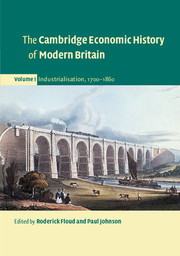Book contents
- Frontmatter
- Chapter1 Accounting for the Industrial Revolution
- Chapter2 Industrial organisation and structure
- Chapter3 British population during the ‘long’ eighteenth century, 1680–1840
- Chapter4 Agriculture during the industrial revolution, 1700–1850
- Chapter5 Industrialisation and technological change
- Chapter6 Money, finance and capital markets
- Chapter7 Trade: discovery, mercantilism and technology
- Chapter8 Government and the economy, 1688–1850
- Chapter9 Household economy
- Chapter10 Living standards and the urban environment
- Chapter11 Transport
- Chapter12 Education and skill of the British labour force
- Chapter13 Consumption in eighteenth- and early nineteenth-century Britain
- Chapter14 Scotland
- Chapter15 The extractive industries
- Chapter16 The industrial revolution in global perspective
- Bibliography
- Index
- References
Chapter16 - The industrial revolution in global perspective
Published online by Cambridge University Press: 28 March 2008
- Frontmatter
- Chapter1 Accounting for the Industrial Revolution
- Chapter2 Industrial organisation and structure
- Chapter3 British population during the ‘long’ eighteenth century, 1680–1840
- Chapter4 Agriculture during the industrial revolution, 1700–1850
- Chapter5 Industrialisation and technological change
- Chapter6 Money, finance and capital markets
- Chapter7 Trade: discovery, mercantilism and technology
- Chapter8 Government and the economy, 1688–1850
- Chapter9 Household economy
- Chapter10 Living standards and the urban environment
- Chapter11 Transport
- Chapter12 Education and skill of the British labour force
- Chapter13 Consumption in eighteenth- and early nineteenth-century Britain
- Chapter14 Scotland
- Chapter15 The extractive industries
- Chapter16 The industrial revolution in global perspective
- Bibliography
- Index
- References
Summary
INTRODUCTION: THE RISE OF BRITAIN AND ITS ECONOMY, 1660–1815
Between 1660 and 1815 Great Britain rose to become the world’s leading commercial and military power, surpassing its European rivals, and all other national economies around the world. Although dating the industrial revolution now seems a pointless exercise, it makes sense to begin an account of Britain’s long transition to geo-political and economic primacy at the Restoration (1660) and to recognise that its maritime hegemony and economic superiority was widely feared at the Congress of Vienna (1815).
Britain simultaneously achieved both power and plenty, with its relatively rapid rate of growth of per capita income and of international trade, as well as its precocious structural change from agriculture to manufacturing. Although there had been some shift to industry prior to 1660, subsequent changes made Britain the world’s richest economy by the start of the nineteenth century. Its dominant navy and powerful army and its fiscal ability to fund armed conflict meant that the British usually emerged victorious from wars with other European powers, a geo-political hegemony that was to persist down to the First World War.
In centralising and strengthening the power of the state, Britain followed the basic outlines of mercantilism, a policy which was also pursued by most other European nations. This meant extensive regulations externally, over foreign trade, shipping and colonial economic activity. British mercantilism existed, however, within a domestic framework of laissez-faire and private enterprise that differed from other nations, and also with a strategy for colonisation less dependent on direct governmental investment and administration in settling and building up satellite economies overseas.
- Type
- Chapter
- Information
- The Cambridge Economic History of Modern Britain , pp. 451 - 464Publisher: Cambridge University PressPrint publication year: 2004

